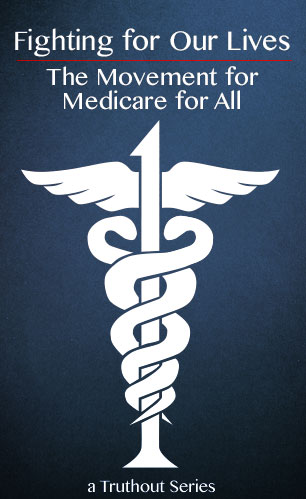
 President Donald Trump hands a pen that he used to sign an executive order on health care to Sen. Rand Paul in the Roosevelt Room at the White House in Washington, DC, on Thursday, October 12, 2017. (Photo: Jabin Botsford / The Washington Post via Getty Images)
President Donald Trump hands a pen that he used to sign an executive order on health care to Sen. Rand Paul in the Roosevelt Room at the White House in Washington, DC, on Thursday, October 12, 2017. (Photo: Jabin Botsford / The Washington Post via Getty Images)This piece is part of Fighting for Our Lives: The Movement for Medicare for All, a Truthout original series.
Don’t believe for a second that the GOP’s threat to your health care has passed.
Although the GOP has failed, for now, to advance a wholesale Affordable Care Act (ACA) repeal bill, the hard right hasn’t given up on its goal of shredding the ACA and Medicaid. They’ve merely switched strategies.
Andy Slavitt, who oversaw the ACA and Medicaid under Obama, calls the GOP’s new strategy a “synthetic repeal”: dismantling health care piece by piece through executive orders, sabotaging the ACA and a budget tax plan with hidden health care cuts. It’s an insidious end-run around the legislative process. But although there’s no single bill to defeat, the citizenry still has the tools to fight back — and even lay the groundwork to go on the offense.
Trump’s anti-ACA executive orders could, in theory, be blocked by new legislation, but that’s unlikely in this Congress. In the near term, the best defense is through the courts — and attorneys general from New York to California are already on the case.
The Republicans want you to believe that their drive for tax cuts for the rich has nothing to do with health care at all.
Trump’s other sabotage efforts, meanwhile, are being directly targeted by new bipartisan legislation. The Alexander-Murray health care bill announced this week would reinstate so-called cost sharing reduction (CSR) payments — reimbursements to insurers for payments they are required to provide to their low-income customers — for two years. It would also go further: It would reinstate ACA outreach budgets that have been spitefully slashed by the Trump administration, unclog approval for health care innovation in states like Minnesota, and — vitally — shift momentum in Congress away from repeal and towards making the system work.
 Alexander-Murray’s prospects are unclear. Citizens’ voices can improve them. Every day that goes by without this bill prolongs the chaos and disruption that Trump is intentionally inflicting on insurance markets and the people who rely on them for coverage. The bill is like something teleported in from an alternate, gentler reality: It’s a genuine bipartisan compromise that moves the country forward. It’s worth fighting for.
Alexander-Murray’s prospects are unclear. Citizens’ voices can improve them. Every day that goes by without this bill prolongs the chaos and disruption that Trump is intentionally inflicting on insurance markets and the people who rely on them for coverage. The bill is like something teleported in from an alternate, gentler reality: It’s a genuine bipartisan compromise that moves the country forward. It’s worth fighting for.
Also, a group of former Obamacare officials have started a citizen-powered effort to make sure the public knows how to enroll in the ACA. You can check that out here.
Meanwhile, the big kahuna for the Republicans is an effort that they want you to believe has nothing to do with health care at all: their drive for tax cuts for the rich.
In the ACA repeal fight, Republicans tried to rip away people’s health care to pay for a tax cut for the wealthy. In the tax fight, Republicans are trying to pass a tax cut for the wealthy — that would ultimately be paid for by ripping away people’s health care. These are two sides of the same class-warfare coin. The GOP budget-and-tax framework that passed on October 19 called for expansive domestic spending cuts, which Democratic budget analysts contend would include more than $1 trillion in cuts from Medicaid and hundreds of billions from Medicare. If they pass their tax plan, which hands 80 percent of the benefits to the top 1 percent, then, like clockwork, health care cut bills are sure to follow — now given added momentum by the manufactured ballooning of the deficit.
Ultimately, the fate of health care depends on who holds power. The GOP’s electoral prospects in 2018 hinge in no small part on their ability to reward their backers through tax-break giveaways — which is yet another reason to treat that battle as an all-hands-on-deck priority. But elections must also be contested directly. And we don’t have to wait until 2018; there are major elections coming up this very year.
The ultimate goal isn’t simply resistance. It’s health care for all.
On November 7, 2017, voters in Maine will weigh in on a ballot initiative to expand Medicaid there. Voters in Virginia will choose their next governor — either Democrat Ralph Northam, who wants to expand Medicaid, or Republican Ed Gillespie, who decidedly does not. In New Jersey, Democrat Phil Murphy is expected to trounce Republican Kim Guadagno in the race to replace Chris Christie — but the margin of victory, and consequent mandate, is up in the air. In those states and beyond, voters will send a message about political momentum that could hasten a growing wave of Republican retirements in the US House (and even Senate), which in turn could affect future party control.
A month later, another contest looms: Democrat and renowned anti-KKK prosecutor Doug Jones is squaring off against dominionist demagogue Roy Moore in Alabama in the fight for Jeff Sessions’s old Senate seat. Amazingly, the latest poll shows them tied. If Democrats pull off an upset in Alabama, the risk of repeal fades further — and the Republicans’ path to passing tax cuts for the rich becomes yet narrower.
After that, it’s a battle royale of the midterm Congressional elections — as well as gubernatorial and down-ballot races across the country. If health care’s allies win big, the threat of repeal is off the table. But if Republicans hold the House and gain a seat in the Senate (or if a Senate seat — say, McCain’s — goes to a pro-repeal Republican in the meantime), the GOP could easily come after the ACA once again. Republicans are well aware that their “skinny repeal” bill failed by a single vote last July.
In the long run, though, the ultimate goal isn’t simply resistance. It’s health care for all. We need to do more than protect the health care we’ve got — we should be profoundly reforming, improving and extending care to cover every person in the country.
We can sustain our energy by holding the vision of truly universal health care in our sights.
To get there, progressives must win control of the House, Senate and White House — and then seize the moment that follows. Our to-do list will be a long one: restoring democracy and reversing voter suppression; comprehensive immigration reform; a new wave of anti-monopoly legislation; and much else. But health care will remain central. And an extraordinarily hopeful debate is underway within the Democratic Party. Bernie Sanders’s historic Medicare for All bill rolled out with a head-turning 16 co-sponsoring senators — including most of those considered potential 2020 contenders. Other Democrats, including Senators Chris Murphy and Brian Schatz, are hard at work on other visionary bills to move the nation toward universal coverage. The ensuing debate could prove as vital and productive as the debate over Democratic health care proposals in the 2007-8 Democratic primary.
On health care, the center of gravity in the Democratic Party and the country at large has shifted markedly left. Even as we fight to prevent the nation from going back — against sabotage, against an unaffordable tax giveaway and in elections year by year — we can sustain our energy by holding the vision of truly universal health care in our sights. Progress is never automatic. But let’s build a movement strong enough to ensure that history is on our side.
We’re not backing down in the face of Trump’s threats.
As Donald Trump is inaugurated a second time, independent media organizations are faced with urgent mandates: Tell the truth more loudly than ever before. Do that work even as our standard modes of distribution (such as social media platforms) are being manipulated and curtailed by forces of fascist repression and ruthless capitalism. Do that work even as journalism and journalists face targeted attacks, including from the government itself. And do that work in community, never forgetting that we’re not shouting into a faceless void – we’re reaching out to real people amid a life-threatening political climate.
Our task is formidable, and it requires us to ground ourselves in our principles, remind ourselves of our utility, dig in and commit.
As a dizzying number of corporate news organizations – either through need or greed – rush to implement new ways to further monetize their content, and others acquiesce to Trump’s wishes, now is a time for movement media-makers to double down on community-first models.
At Truthout, we are reaffirming our commitments on this front: We won’t run ads or have a paywall because we believe that everyone should have access to information, and that access should exist without barriers and free of distractions from craven corporate interests. We recognize the implications for democracy when information-seekers click a link only to find the article trapped behind a paywall or buried on a page with dozens of invasive ads. The laws of capitalism dictate an unending increase in monetization, and much of the media simply follows those laws. Truthout and many of our peers are dedicating ourselves to following other paths – a commitment which feels vital in a moment when corporations are evermore overtly embedded in government.
Over 80 percent of Truthout‘s funding comes from small individual donations from our community of readers, and the remaining 20 percent comes from a handful of social justice-oriented foundations. Over a third of our total budget is supported by recurring monthly donors, many of whom give because they want to help us keep Truthout barrier-free for everyone.
You can help by giving today. Whether you can make a small monthly donation or a larger gift, Truthout only works with your support.